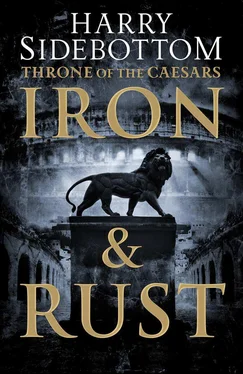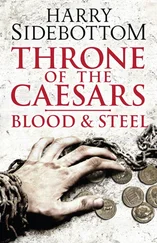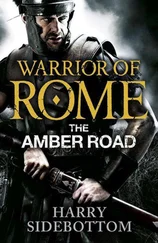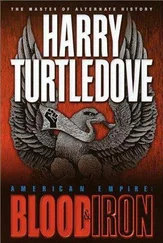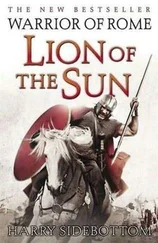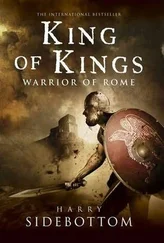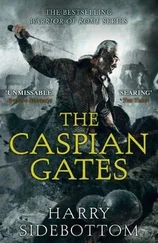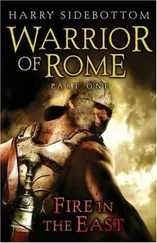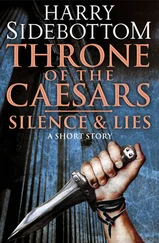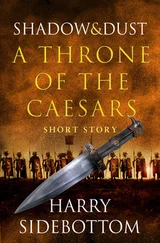Harry Sidebottom - Iron and Rust
Здесь есть возможность читать онлайн «Harry Sidebottom - Iron and Rust» — ознакомительный отрывок электронной книги совершенно бесплатно, а после прочтения отрывка купить полную версию. В некоторых случаях можно слушать аудио, скачать через торрент в формате fb2 и присутствует краткое содержание. Год выпуска: 2014, Издательство: HarperCollins Publishers, Жанр: Исторические приключения, на английском языке. Описание произведения, (предисловие) а так же отзывы посетителей доступны на портале библиотеки ЛибКат.
- Название:Iron and Rust
- Автор:
- Издательство:HarperCollins Publishers
- Жанр:
- Год:2014
- ISBN:нет данных
- Рейтинг книги:4 / 5. Голосов: 1
-
Избранное:Добавить в избранное
- Отзывы:
-
Ваша оценка:
- 80
- 1
- 2
- 3
- 4
- 5
Iron and Rust: краткое содержание, описание и аннотация
Предлагаем к чтению аннотацию, описание, краткое содержание или предисловие (зависит от того, что написал сам автор книги «Iron and Rust»). Если вы не нашли необходимую информацию о книге — напишите в комментариях, мы постараемся отыскать её.
Iron and Rust — читать онлайн ознакомительный отрывок
Ниже представлен текст книги, разбитый по страницам. Система сохранения места последней прочитанной страницы, позволяет с удобством читать онлайн бесплатно книгу «Iron and Rust», без необходимости каждый раз заново искать на чём Вы остановились. Поставьте закладку, и сможете в любой момент перейти на страницу, на которой закончили чтение.
Интервал:
Закладка:
The clash of steel echoed back from the walls. A misjudged blow sparked against the stone. Both narrow colonnades were blocked. Shapes flickered against the lamps in the room beyond.
The traitors must not escape.
A foot on the rim, and Maximinus jumped down into the blackness of the pool. He skidded as he landed, regained his balance. The water was very cold. But, thank the gods, not deeper than his knees. It sloshed into his boots as he waded past the fountain.
A young man with a sword appeared at the edge. The elaborately curled hair and finely worked sword-belt proclaimed him the treacherous Praetorian tribune.
‘Tyrant!’
The blade shimmered as the officer thrust. Maximinus’ left foot went from under him. Somehow, falling, he blocked. He landed hard on his arse, in a great spray of water. The impact jarred up his spine. His sword was knocked from his grip. Almost gracefully, the tribune stepped down into the pool. Feverishly, Maximinus ran his hands across the floor of the pool. The tribune came on carefully. Maximinus’ hand closed on the hilt. He floundered backwards to his feet. His opponent closed, feinted high and cut low to the left thigh. Maximinus caught it near the hilt of his weapon, gave ground.
They shifted, seeking an opening. The dark water sucked and pulled at their legs as they moved. Distant, irrelevant sounds of fighting. Of more pressing concern were the noises of men jumping into the pool, moving towards them. The tribune flicked a glance beyond Maximinus. It was enough. With brute strength, Maximinus forced his adversary’s sword wide. Stepping inside, he smashed the pommel of his weapon into the man’s face. Reeling, off balance, the young officer could do nothing to prevent Maximinus bringing the edge of sharp steel down into his sword arm. It was over. The tribune screamed. He dropped his sword. Clutching his wounded wrist with his good hand, he doubled up.
‘Do not kill him.’ Maximinus moved past, and clambered out.
There were two men in the dining room. Maximinus scanned all four corners. There was no other exit; nowhere to hide. Perhaps the fat Senator Claudius Venacus was not as stupid as he looked. Either that, or cowardice had kept him away. Whatever the motive behind his absence, it would do him no good. Volo’s frumentarii would catch him before midday.
‘Wh-what is happening?’
Maximinus looked at the Senator who spoke.
‘We have done nothing.’ Catilius Severus was very pale. His hands, soft and feminine, were spread in a mime show of incomprehension. ‘We were making offerings … offerings to the gods.’
Maximinus was aware of armed men filling the doorway behind him. ‘The traditional gods do not hide from the sun. Any deity that demands his worshippers meet in secret, lurk in the dark, is an enemy of Rome.’
The other Senator spoke. ‘It is time for the truth. We were talking treason.’
With his protruding eyes, Caius Petronius Magnus looked like some creature which scuttled along the seabed, but Maximinus felt a flicker of admiration.
‘We were approached to join a conspiracy.’ Magnus’ voice was steady. ‘We needed to know how wide it went, needed conclusive evidence, before we denounced it.’
‘Who approached you?’
Magnus looked straight into the face of Maximinus. ‘One you trusted, the governor of Germania Inferior.’
Maximinus gestured over his shoulder. A man walked forward. Maximinus put an arm around his shoulder. ‘What do you think of that, my little Greek?’
‘I told you they would say that,’ said Timesitheus.
CHAPTER 11
The East
Northern Mesopotamia,
Three Days before the Kalends of May, AD235
A new Emperor sat on the throne of the Caesars. As his horse plodded, head down under the hot sun, Gaius Julius Priscus turned the news over in his mind. The governor of Mesopotamia and Osrhoene had plenty of time to think. The messenger had reached him, at long last, as he rode north on the desert road back to his province from the client kingdom of Hatra. The mountains beyond the town were in sight, but the small column was still some hours from the outpost town of Singara.
What would the accession mean for the provincials between the upper reaches of the Euphrates and Tigris? Ceremonies would be enacted, with many sacrifices and a new name in the oaths. In time there would be a new portrait on the coins they handled; that same face would stare down from statues in the marketplaces and from portrait busts and paintings in official buildings and the homes of the conspicuously loyal. The most immediate impact would be the additional expense. Every community in the territory would have to voluntarily send their new Augustus a crown of gold. There would be a lather of activity. No town, no matter how insignificant, would want to risk imperial displeasure by being late or niggardly with its contribution. The Emperor might be as distant as a god but, like a deity, at any moment, completely unforeseen, he could reach down into their lives. The local elite would pledge ostentatiously large sums and then squeeze what they had promised out of their tenants and clients. And then the provincials would get on with their mundane existence: the poor herding goats and scratching a living from the soil; the rich borrowing money they never intended to repay, committing adultery with each other’s wives and launching malicious litigation aimed at their neighbour’s property; and everyone, high and low, would still worry that a Persian raid would end it all, would see them and their loved ones driven off into slavery or left dead among the ruins of everything they had known.
Some, his brother Philip among them, would consider his views jaundiced, but Priscus had never had any time for sentimentality. And he knew these people. He had been born in a dusty village in the province of Arabia, had grown up speaking a dialect of the Aramaic they spoke here in Mesopotamia. It was a hard world — nowhere harsher than the arid frontier lands of the East — and you had to be hard to rise up out of such an environment.
There was a dry wadi about a mile ahead. It curled around from the east and ran across their way. The landscape was not quite as desolate as it had been. For two days after leaving Hatra there had been nothing but a vast expanse of ochre-grey sand, occasionally punctuated by scatters of rocks and the derelict-looking huts of shepherds which clustered around the few sulphurous wells. Since they broke camp this morning, there had been isolated patches of green, a few yellow and blue flowers in the odd hollow. Even the flies did not seem to cluster quite so maddeningly around their eyes and those of their horses. The country might be a little less bleak, but the road was still an unmade track, and they would have to negotiate the steep sides of the dry watercourse, for there was no bridge.
Priscus had met the new Emperor a few times three years before during the eastern campaign of Alexander. A huge man, strikingly ugly, Maximinus had been one of the officers charged with gathering supplies. Taciturn and grim, he had carried out his duties with honesty and efficiency, if without charm. An equestrian like Priscus, he had risen through the army. Now, as Emperor, he had inherited a full-scale war on the northern frontier. No doubt Maximinus would wage it with the utmost vigour. And that, for Priscus, was an alarming proposition.
There was no declared war in the East, but Persian incursions were increasing in number and range. Only an imbecile could fail to realize that they heralded a major attack. The Sassanid Ardashir had fought the field army of Alexander to a standstill, and the King of Kings had shown no sign of renouncing his claim to all the lands once held, centuries before, by the Persian dynasty of the Achaemenids. If the threat could be made reality, it would take Persian horsemen to the Aegean and beyond.
Читать дальшеИнтервал:
Закладка:
Похожие книги на «Iron and Rust»
Представляем Вашему вниманию похожие книги на «Iron and Rust» списком для выбора. Мы отобрали схожую по названию и смыслу литературу в надежде предоставить читателям больше вариантов отыскать новые, интересные, ещё непрочитанные произведения.
Обсуждение, отзывы о книге «Iron and Rust» и просто собственные мнения читателей. Оставьте ваши комментарии, напишите, что Вы думаете о произведении, его смысле или главных героях. Укажите что конкретно понравилось, а что нет, и почему Вы так считаете.
